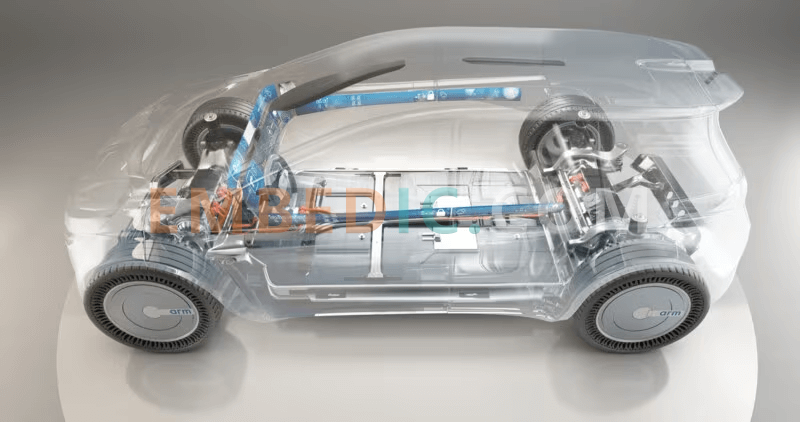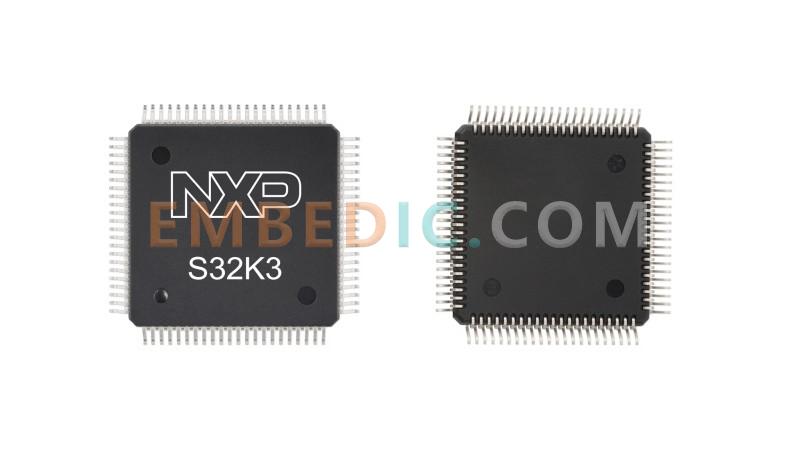The automotive industry has witnessed significant advancements in technology over the years, and automotive microcontrollers (MCUs) have played a crucial role in driving these innovations. Automotive MCUs are specialized microcontrollers designed specifically for automotive applications, offering enhanced performance, reliability, and safety features.

In this article, we will provide an overview of automotive MCUs, their importance in modern vehicles, and the key features that make them well-suited for the automotive industry.
Currently, there are three main processor architectures in the Automotive MCU market, namely the x86 architecture led by Intel and AMD, the widely used Arm architecture, and the RISC-V architecture, which has gained popularity in recent years.
As a chip company, Arm does not produce chips, but there are billions of devices around the world running on chips based on Arm cores, and Arm's chip technology almost covers a wide range of industry applications, including smartphones, automobiles and the Internet of Things. According to Arm's forecast, from 2021 to the next decade, shipments of processors based on the Arm architecture will reach 300 billion units.
Unlike Intel- or AMD-based x86 architectures, Arm processors are not central processing units (CPUs), but systems-on-a-chip (SoCs), which can be the core of device controllers, microcontrollers (MCUs) or other ancillary components in a system, depending on the design of its system. Since the beginning of the ARMv7 architecture, Arm processors have been divided into three main families, Cortex-A, Cortex-R, and Cortex-M. The division of these three families is also very clear, namely: the Cortex-A family is geared towards cutting-edge virtual memory-based operating systems and user applications; the Cortex-R family targets real-time systems; and the Cortex-M family corresponds mainly to microcontrollers.
Cortex-A is often seen in the market as the workhorse of the Arm family. As originally envisioned, Cortex-A is now at the heart of two emerging devices, smartphones as well as single board computers.
Cortex-R is a relatively narrowly used class of processors geared towards microcontroller applications that require real-time processing, a good example being 4G LTE and 5G modems. Now, Cortex-R is being used as a mass storage controller for solid-state flash memory.
The smaller "form factor" of Cortex-M makes it ideal for size-sensitive applications such as automotive control and braking systems, and high-definition digital cameras with image recognition. recognition and radar applications.
More than a decade of application practice has shown that smartphones, automobiles, industry, and the Internet of Things have become the main battleground for MCU applications. With the development of vehicles toward electrification, networking, and intelligence, the sales of automotive MCUs are going up year by year. In the past decade, automotive MCUs have accounted for about 40% of total MCU sales. According to IC Insights' 2021 McClean Report, automotive MCU sales soared 23% to a record $7.6 billion in 2021 and are expected to grow strongly by 14% and 16% in 2022 and 2023, respectively, despite a continued shortage of microcontrollers and automakers having to temporarily shut down some assembly lines in 2021.
In terms of product distribution, in 2021, more than three-quarters of automotive MCU sales will come from 32-bit MCUs, which are expected to reach about $5.83 billion; 6-bit MCUs will generate about $1.34 billion in revenue; and 8-bit MCUs will generate about $441 million in revenue (Figure 3). Because 32-bit MCUs have a higher average selling price, they will contribute significantly to sales in 2021. IC Insights' forecast shows that the average selling price of all 32-bit MCUs is declining at a compound annual growth rate (CAGR) of -4.4% year over year from 2015 to 2020, but rises by about 13% to about $0.72 in 2021.
From an application perspective, automotive infotainment (entertainment and information systems used to retrieve digital maps, identify locations, and transmit access to data from the Internet and satellites) accounts for 10% of total automotive MCU sales in 2021 (~$780 million), with the remaining 90% coming primarily from automotive engine control, powertrain, brakes, steering, power windows, battery management, etc. Revenue from these MCUs reached $6.8 billion. According to IC Insights, MCU sales in the automotive infotainment market grew by 59% in 2021 compared to 2020, and other automotive MCUs saw a 20% increase in revenue.
Complex next-generation automotive architectures cannot be supported without powerful automotive MCUs. Key players in the global microcontroller market include NXP, STMicroelectronics, Microchip, Renesas, Infineon (Infineon), TI (Texas Instruments), and others. Among them, the top five MCU providers have a market share of more than 50%. These companies are also major players in automotive MCUs, and they actively participate in the product development of their partners and continue to launch new automotive MCU products.

ST offers a broad portfolio of microcontrollers for automotive applications, with the recently announced Stellar family being its latest high-performance 32-bit automotive MCU. Stellar integrated MCUs provide secure, reliable and deterministic solutions for the next generation of vehicle architectures. The Stellar P-Series is designed to meet the integration needs of next-generation drivetrains, electrification solutions and domain-oriented systems, enabling higher levels of real-time performance, safety and determinism. greater security.

Historically focused on vehicle dynamics systems such as braking, chassis and powertrain control, automotive functional safety has now expanded to cover the entire range of vehicle applications, from body control modules and battery management systems (BMS) to area and motor control ECUs. Central to this is the MCU's role as the primary safety and application processor or safety companion IC.
The S32K MCU family such as FS32K142HAT0MLHT is a new addition to the NXP S32 automotive electronics platform that helps reduce automotive software cost and complexity to create smarter, functionally safer and more secure vehicles for applications such as body, area control and electrification. the S32K3 family includes scalable 32-bit MCUs based on the Arm Cortex-M7 that support ASIL B/D safety Single-core, dual-core and lock-step core configurations for applications. Also features a hardware security engine (HSE) with NXP firmware, support for firmware over-the-air (FOTA) updates, and free ISO 26262-compliant real-time drivers (RTDs) for AUTOSAR and non-AUTOSAR applications.
Since the acquisition of Cypress in 2020, Infineon's body control solutions are more complete. the Cypress Traveo™ II family is a new generation of 32-bit MCUs designed for automotive body electronics applications. in the single-core Arm Cortex-M4F and dual-core Cortex-M7F, the Traveo II family has built-in processing power and network connectivity, increasing its performance from 400 DMIPS in the Traveo series to 1500 DMIPS in the Traveo II series.
In addition, the Traveo II series integrates an HSM (Hardware Security Module), a dedicated Cortex-M0+ for secure processing, and a dual-memory mode embedded flash memory for FOTA requirements with advanced security features.
The TDA4VM Jacinto processor, developed by Texas Instruments, is indeed highly suitable for advanced driver assistance systems (ADAS) and self-driving cars. The TDA4VM (TDA = Texas Instruments Digital Automotive) is a powerful automotive-grade system-on-chip (SoC) specifically designed to meet the demanding computational requirements of autonomous driving applications.
Main Features of TDA4VM as follows:
In conclusion, automotive MCUs have revolutionized the automotive industry by providing advanced computing capabilities and enabling the integration of various electronic systems in vehicles. With their robust performance, safety features, and compatibility with automotive standards, these MCUs play a vital role in enhancing vehicle performance, efficiency, and safety.
As technology continues to evolve, automotive MCUs will continue to evolve as well, incorporating new features and capabilities to meet the ever-increasing demands of the automotive industry. Whether it's for advanced driver-assistance systems, infotainment systems, or vehicle control units, automotive MCUs are instrumental in shaping the future of automotive technology and driving the development of smart and connected vehicles.
Manufacturer: STMicroelectronics
IC MCU 32BIT 16KB FLASH 48LQFP
Product Categories: 32bit MCU
Lifecycle:
RoHS:
Manufacturer: Texas Instruments
IC DSP FIX/FLOAT POINT 256BGA
Product Categories: DSP
Lifecycle:
RoHS:
Manufacturer: Texas Instruments
IC DGTL MEDIA PROCESSR 684FCBGA
Product Categories: DSP
Lifecycle:
RoHS:
Manufacturer: Texas Instruments
IC DGTL MEDIA PROCESSR 1031FCBGA
Product Categories: DSP
Lifecycle:
RoHS:
Looking forward to your comment
Comment